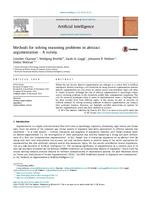Methods for Solving Reasoning Problems in Abstract Argumentation – A Survey
From International Center for Computational Logic
Methods for Solving Reasoning Problems in Abstract Argumentation – A Survey
Günther CharwatGünther Charwat, Wolfgang DvořákWolfgang Dvořák, Sarah Alice GagglSarah Alice Gaggl, Johannes Peter WallnerJohannes Peter Wallner, Stefan WoltranStefan Woltran
Günther Charwat, Wolfgang Dvořák, Sarah Alice Gaggl, Johannes Peter Wallner, Stefan Woltran
Methods for Solving Reasoning Problems in Abstract Argumentation – A Survey
Artificial Intelligence Journal, 220(0):28-63, March 2015
Methods for Solving Reasoning Problems in Abstract Argumentation – A Survey
Artificial Intelligence Journal, 220(0):28-63, March 2015
- KurzfassungAbstract
Within the last decade, abstract argumentation has emerged as a central field in Artificial Intelligence. Besides providing a core formalism for many advanced argumentation systems, abstract argumentation has also served to capture several non-monotonic logics and other AI related principles. Although the idea of abstract argumentation is appealingly simple, several reasoning problems in this formalism exhibit high computational complexity. This calls for advanced techniques when it comes to implementation issues, a challenge which has been recently faced from different angles. In this survey, we give an overview on different methods for solving reasoning problems in abstract argumentation and compare their particular features. Moreover, we highlight available state-of-the-art systems for abstract argumentation, which put these methods to practice. - Forschungsgruppe:Research Group: Computational LogicComputational Logic, Logische Programmierung und ArgumentationLogic Programming and Argumentation
@article{CDGWW2015,
author = {G{\"{u}}nther Charwat and Wolfgang Dvo{\v{r}}{\'{a}}k and Sarah
Alice Gaggl and Johannes Peter Wallner and Stefan Woltran},
title = {Methods for Solving Reasoning Problems in Abstract Argumentation
{\textendash} A Survey},
journal = {Artificial Intelligence Journal},
volume = {220},
number = {0},
publisher = {Elsevier},
year = {2015},
month = {March},
pages = {28-63},
doi = {10.1016/j.artint.2014.11.008}
}
